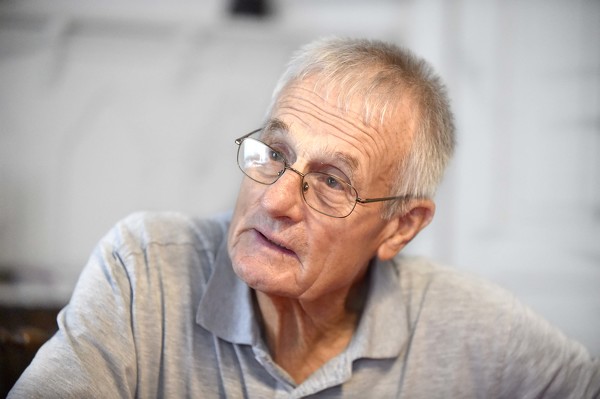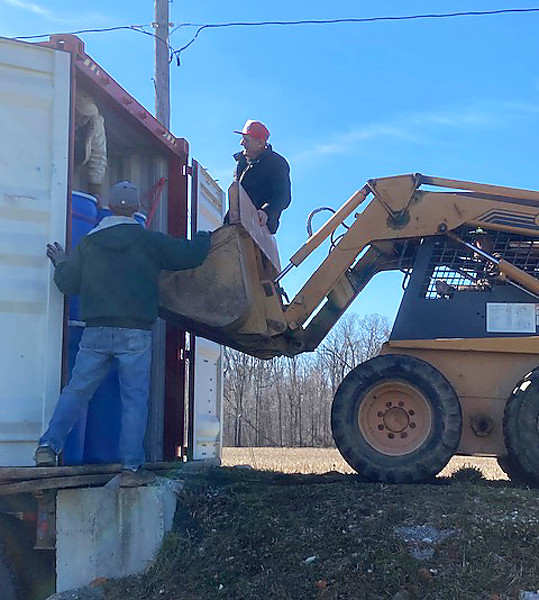Monday, October 18th, 2021
Feeding the poor in Haiti
Brother has sent tons of soymeal
By Erin Gardner

Photo by Dan Melograna/The Daily Standard
Brother Nick Renner has sent tons of soymeal to poor in Haiti.
ST. HENRY - Brother Nick Renner has been sending soymeal to villages in Haiti for 20 years after receiving a "sign" from a hungry man he ignored and later regretted.
Renner recounted the experience during his first visit to Haiti in 1975.
During that visit, Renner said he prayed for God to send him a sign if he wanted Renner to do anything while there. When he was in Haiti's capital of Port-au-Prince, he visited the Iron Market, a mall. After buying trinkets, Renner got on a bus.
"Somebody tapped me on the shoulder through the window. The guy says, 'I'm hungry, I have nothing to eat.' I ignored him because once you start handing out, people swarm you," Renner said. "He did it again. He tapped me on the shoulder and said, 'Can you help me out? I'm hungry.' I did notice that this guy is skinny. I ignored him again. The third time, the bus started up and the guy said, 'God bless you' and the bus moved away.
Renner said he later realized this was the sign he had prayed for, but he didn't "get it" until the bus was driving away. The experience tugged at his heart.
"I've been trying to feed him ever since," he said.
Renner sends 21 1/2 tons of soymeal, totaling 156 barrels, to Haiti twice a year. The soymeal goes to nursing mothers and their babies as a way to supplement their nutrition as an inexpensive source of protein. He sent a shipment down last week and will send another shipment this spring.
"I'm running 45% protein, which they need, and I moved the fat in the soymeal up to 13%," Renner said. "This has developed over time. I think it's about the third time we fine-tuned it to something better."
Renner said many Haitians only have black beans and very little meat in their diet, except for chickens or hogs they have running around.
"Soymeal is not meat, but it's pretty close to it."
The food-grade soybeans are locally grown in Mercer County, and Renner buys a load for $9,000 to $10,000. He gets the funds from free-will donations.
The 103 remote villages the shipments go to aren't directly in Haiti; they're outside of Jeremie. Renner works through the Haitian Health Foundation whose workers distribute the soymeal to women in the villages.
"I've been to a lot of poor countries but nothing like Haiti," Renner said of the extreme poverty.
Health agents in the villages test the mother's hair to determine malnourishment. If the mothers and their kin qualify, they get a gallon of soymeal.
While visiting the country with several doctors from New York City who would take vacation and donate their time to help the Haitian people, they said, "You're probably doing more good than we are. We try to fix them after they're broke and you try to keep them healthy," Renner said.
Renner uses large 55-gallon plastic barrels donated by the Fremont Company in Rockford to ship the soymeal. An official at the plant reached out to Renner and donated as many as he could, Renner said.
"We get the barrels, we wash them out and then we put a liner in them … so it's clean clean, just like we do it here," he said.
After the barrels arrive in Haiti, they are then used to store water for drinking and other uses.
"We used to ship a lot of white barrels and then they mentioned send(ing) black barrels or darker barrels. I couldn't get black barrels, but I could get blue barrels," Renner said. "They fill these barrels up with water after we get the soymeal down, they get it emptied out and they fill them with water. (They) let them sit in the sun and that sun heats up the water and kills a lot of the bacteria. A lot of the sediment, which carries the bacteria, will settle to the bottom and (purify) the water."
"We used to work our tails off trying to clean up these old barrels because we just couldn't afford new barrels," Renner said.
"It's 100% for the cause. There's no overhead. My labor is free and … eight or nine guys (volunteer and) fill the barrels," Renner said.

Photo by Dan Melograna/The Daily Standard
Brother Nick Renner supervises as a team of volunteers places barrels full of soymeal into a trailer.



